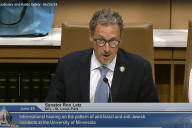You have /5 articles left.
Sign up for a free account or log in.
Adjuncts at Pacific Lutheran University in Washington have the right to vote on whether to unionize, a regional National Labor Relations Board officer has ruled.
The victory is significant because legal precedents prohibit tenure-track faculty at most private institutions from unionizing, and the issue of adjunct unions -- accepted at non-religious private institutions -- has become controversial at some religious colleges. Adjuncts seeking better wages and working conditions at several Roman Catholic colleges have won NLRB backing to unionize, although the institutions are challenging those rulings. Some other Catholic institutions -- including Georgetown University -- have not sought to block collective bargaining.
Service Employees International Union Local 925, which is helping adjuncts at Pacific Lutheran in their attempts to unionize, called the ruling “precedent-setting” in a news release.
Adjuncts at Pacific Lutheran began organizing last summer. The university challenged their efforts, citing an exception to federal labor law for religious institutions stemming from the 1979 U.S. Supreme Court case NLRB v. Catholic Bishop of Chicago.
In that case, the court concluded that schools operated by a church to teach both religious and secular subjects are not subject to the National Labor Relations Act, and therefore not within NLRB jurisdiction, due to concerns about federal agencies becoming involved in regulating religious institutions. Unions challenging the use of that ruling to limit adjuncts' collective bargaining rights have noted that adjuncts generally teach subjects other than theology, have agreed not to negotiate over religious issues, and want to focus collective bargaining on wages, benefits and other issues.
In his Pacific Lutheran decision, Seattle-based Ronald K. Hooks, regional director for the labor board, said NLRB jurisdiction does not risk church-state entanglement because the university is “inspired by Lutheranism” but emphasizes academic excellence and “acceptance of all faiths (and none) and explicitly de-emphasizes any specific Lutheran dogma, criteria or symbolism in its public communications.”
Hooks continued: “It may be that providing a rigorous liberal arts education fosters searching inquiry and comports well with Lutheran tradition, but doing so does not make the university a religious institution.” He based his ruling on several observations about the university’s funding, governance structure and values. First, even though Pacific Lutheran is affiliated with the Evangelical Lutheran Church in America and own by its regional congregation, it receives only about $200,000 annually, or a “tiny percentage,” of its funding from the church. And even though just over half of Pacific Lutheran’s regents must be Lutheran, some of whom must be ministers, he said, “neither the church nor the congregations are involved in the day-to-day administration of the school.”
No members of the administration or faculty are required to be Lutheran, he noted, and although various university events and publications reflect its Lutheran history, its mission to educate “makes no mention of God, religion or Lutheranism.”
Although the influential U.S. Court of Appeals for the Federal Circuit in Washington, D.C., has repeatedly refused to enforce rulings based on this kind of “substantial religious character” test, Hooks said, he believed his ruling also aligned with the court’s standard: that institutions are exempt from board jurisdiction only if they hold themselves out to students, faculty and community as providing a religious or educational environment; are organized as nonprofit organizations; and are affiliated with or owned, operated or controlled by – either directly or indirectly – a recognized religious organization.
Pacific Lutheran also asserted that some of its 176 adjuncts had managerial duties, and therefore should be prohibited from organizing based on the landmark U.S. Supreme Court NLRB v. Yeshiva University decision of 1980 that still technically prohibits tenure-track faculty members at private colleges from unionizing.
Additionally, it argued, the different levels and designations of adjuncts -- including full-time contingent faculty who have benefits and some governance privileges -- at Pacific Lutheran did not share sufficient common interests to belong to the same bargaining group with part-time instructors. Hooks also found insufficient evidence to back those arguments, saying that even though Pacific Lutheran contingent faculty may determine the content of their courses, evaluate students and supervise their own research, their authority within the greater university structure is not enough to make them managers, according to Yeshiva.
Edith Disler, a university spokeswoman, called the ruling “legally and factually incorrect” and said Pacific Lutheran is planning to appeal, joining with three Catholic institutions -- Manhattan College, St. Xavier College and Duquesne University – that are awaiting review by the national-level NLRB of similar rulings made at the regional level.
At Pacific Lutheran, adjunct organizers already are moving ahead with plans for a union vote, slated for the fall. Michael K. Ng, an adjunct lecturer of languages and literature who provided testimony for the NLRB review, said he was confident the vote would result in a union.
“Through the union we hope to achieve greater voice,” he said. “A lot of my colleagues, and myself, don’t have the opportunity to affect significant change in faculty governance, and we can’t bring forth proposals.”
The ruling brings Pacific Lutheran closer to its roots, as evangelical Lutheranism stresses social justice, Ng added. “Look, if there’s a problem in the world, you go out and fix it.”









